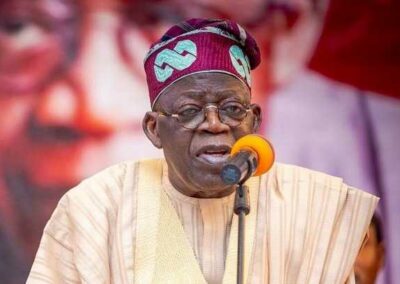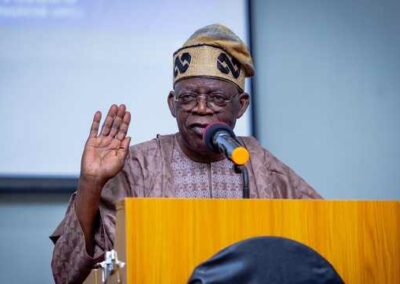The presidential candidate of Nigeria’s ruling party, the All Progressive Congress (APC), Asiwaju Bola Ahmed Tinubu, has been declared the winner of Nigeria’s presidential election. The 71-year-old, having scored a simple majority of votes cast and won at least 25% of the votes in the required 25, was said to have met the requirement to be elected president. He was declared the winner of the closely contested election on Wednesday morning by the chairman of the Independent National Electoral Commission, INEC, Professor Mahmud Yakubu.
Mr Tinubu scored a total of 8,794,726 votes to defeat his closest rival, Alhaji Atiku Abubakar, who got 6,984,520. Peter Obi of the Labour party, whom many of the youths presume to be the actual winner of the election scored a total of 6,101,533 votes. Rabiu Musa Kwankwaso, the presidential candidate of the NNPP, came fourth with 1,496,687 votes.
Professor Yakubu said a certificate of Return would be presented to Mr Tinubu at 3 pm in Abuja, the country’s capital.
“The era of renewed hope”
Following his declaration as the winner of Saturday’s presidential election, Bola Tinubu, Nigeria’s president-elect has commended Nigerians for electing him as their president.
“I am profoundly humbled that you have elected me to serve as the 16th president of our beloved republic,” Tinubu said on Wednesday in his acceptance speech. “This is a shining moment in the life of any man and an affirmation of our democratic existence. From my heart, I say thank you.”
Tinubu said those that voted for the other candidates also voted for a better nation and commended them for participating in the democratic process.
While many Nigerians feel the process was manipulated by the ruling party to retain power, Tinubu commended the electoral body for conducting a “free and fair” election and admitted that there were lapses that would be improved on in the future.
“We commend INEC for running a free and fair election. The lapses that did occur were relatively few in number and were immaterial to the final outcome,” Tinubu continued. “With each cycle of elections, we steadily perfect this process so vital to our democratic life.”
Finally, Tinubu called on his fellow contestants, Atiku Abubakar, Peter Obi, and Rabiu Musa Kwankwaso to come work with him, adding that the campaign was competitive and high-spirited.
Mr Tinubu had campaigned with the slogan of “renewed hope,” promising to continue the legacy of President Muhammadu Buhari.
Who is Tinubu?
Bola Tinubu is a Nigerian politician and accountant, born on March 29 1952. He served as a Senator representing Lagos West Senatorial District during the short-lived third Republic from 1992 to 1993.
On the country’s return to democracy, Tinubu became the governor of Lagos State after winning the 1999 governorship election by a wide margin. He won re-election in 2003 with a narrower margin. During his time as governor, he was a known critic of then-president Olusegun Obasanjo, as he was the strongest opposition governor at the time.
After 8 years as governor, the veteran politician continued to dominate Lagos State’s politics and has been described by some as a kingmaker, for being a major decider of who becomes the governor of the State. During a campaign to become the flagbearer of his party, which is also the party of the incumbent president Muhammadu Buhari, Tinubu boasted of singlehandedly making Buhari the winner of the 2015 election and eventually the 2019 election.
“If not me that led the war front, Buhari wouldn’t have emerged. He contested first, second and third times, but lost. He even said on television that he won’t contest again,” Tinubu said in the Yoruba language.
“But I went to his home in Katsina. I told him you would contest and win, but you won’t joke with the matters of the Yorubas. Since he has emerged, I have not been appointed minister. I didn’t get a contract,” he continued. “This time, it’s Yoruba’s turn and in Yorubaland, it’s my turn.”
The 70-year-old has been widely criticised for the speech, which he later said was mistranslated.
Lagos State witnessed significant growth during his time as Governor of the State, and he has been described by his supporters as the architect of modern-day Lagos. However, there have been disputes over his age, name, educational qualification, and recently, allegations of drug-related offences.
Another issue of concern is Tinibu’s health. In some of his campaigns, the former governor has altered some unintelligible words, causing many to fear that he could be having mental decline with age. But none of these has stopped him from winning his party’s ticket for the election and the general elections.
Buhari congratulates Tinubu
Nigeria’s president Muhammadu Buhari has congratulated President-elect Bola Ahmed Tinubu for his victory in the election.
He said: “I congratulate His Excellency Bola Ahmed Tinubu on his victory. Elected by the people, he is the best person for the job. I shall now work with him and his team to ensure an orderly handover of power.”
President Buhari while commending the contestants, admitted that there were flaws in the process but insisted that the process was free and fair. He added that politicians that lost in the election should not lead protests in the streets, rather they should go to the courts to prove their point.
“If any candidate believes they can prove the fraud they claim is committed against them, then bring forward the evidence,” Buhari continued. “If they feel the need to challenge, please take it to the courts, not to the streets.”
Nigeria’s worst election?
Although INEC, the ruling party (APC) and the Nigerian government had insisted that the process was free and fair, it appears that many Nigerians do not think so. Following INEC’s declaration that Tinubu was the winner of the election, social media is already filled with complaints about the process and some are even calling for a protest or a revolution against the government. To them, it was the worst election in the country’s history. Why?
Voters’ suppression
Voters turnout on election day was unarguably the largest in the country’s history. About 90 million people have registered to vote in the election. The majority of these people were on the ground to cast their vote on Saturday. However, politicians have been accused of conniving with the electoral body to prevent the majority of these people from voting, especially in the stronghold of opposition parties.
“Inspite of who is declared winner, INEC has made that victory tainted for presiding over a flawed process. Indeed democracy is never truly about who wins or loses, it’s about getting every citizen to have a say through the ballot,” Seyi Oladeji, a Twitter user wrote.
Like Seyi, many Nigerians think they did not get a chance to vote for their next president, and it was not their fault. In the end, Nigeria recorded its lowest voters’ turnout instead of the opposite.
The power of incumbency
Nigeria had a total of 36 state governors. All these governors have significant influence over the electoral officials in charge of their states, thereby undermining their independence.
For example, the Governor of Rivers State, Nyesom Wike, has been accused of influencing the election result in his state and allocating thousands of votes to the ruling All Progressive Congress.
“Wike will go down in history as the most foolish election rigger in Nigeria,” a Twitter user wrote.
So far, over 100,000 Nigerians have signed the petition asking the United States, the UK, Canada and other countries to cancel the Governor’s visa.
Like Wike, other governors across the country have been accused of manipulating elections in their states, either by paying a huge amount of money to officials or by threatening them. There were even instances of security officials joining in the snatching of ballot boxes and destroying voting materials. This can only happen on the order of the state governor.
No electronic transmission of the result
The Independent National Electoral Commission has promised to transmit all election results from the voting points. However, when it was time to upload the results on the INEC result viewing portal, most officials refused to do so and even the ones that tried to could not.
The results were transferred to the Local government collation centres, contrary to the assurance that they would be uploaded at the voting centres.
In several parts of the country, many believe the results were manipulated at several collation centres, which is possible because of Nigeria’s political structure. Pictures of final polling unit results shared online by agents of political party agents are often contrary to what was announced by INEC. Hence the protest from leading opposition parties.
INEC promises to review the election. Can it be trusted?
Following claims by various parties that the election was not a reflection of the people’s will, the chairman of the electoral body said the commission would review the process if there is a cause to do so.
“Let me seize this opportunity to assure Nigerians that we will do whatever we can within the confines of the law to review issues arising from the conduct of elections,” Mr Yakubu said.
However, many citizens seem to have lost confidence in the body, with many calling for his resignation.


























0 Comments